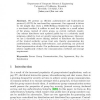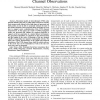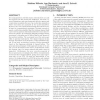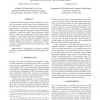41 search results - page 5 / 9 » Secret Handshakes from Pairing-Based Key Agreements |
NETWORKING
2004
13 years 9 months ago
2004
We present an efficient authenticated and fault-tolerant protocol (AFTD) for tree-based key agreement. Our approach is driven by the insight that when a Diffie-Hellman blinded key ...
ICC
2009
IEEE
13 years 5 months ago
2009
IEEE
Theoretical models of ultrawideband (UWB) radio channels indicate that pairs of UWB radio transceivers measure their common radio channel with a high degree of agreement and third ...
WISEC
2010
ACM
14 years 12 days ago
2010
ACM
Key management in wireless sensor networks does not only face typical, but also several new challenges. The scale, resource limitations, and new threats such as node capture and c...
EUROCRYPT
2009
Springer
14 years 8 months ago
2009
Springer
A group key agreement (GKA) protocol allows a set of users to establish a common secret via open networks. Observing that a major goal of GKAs for most applications is to establish...
ICASSP
2011
IEEE
12 years 11 months ago
2011
IEEE
Traditional channel quantization based methods for encryption key generation usually suffer from the quantization error which may decrease the key agreement ratio between authoriz...




